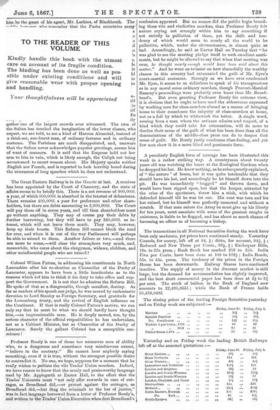Professor Beefily is one of those too numerous men of
ability -who, to a dangerous and sometimes very mischievous extent, 4‘ believe in the contrary." He cannot hear anybody saying something, even if it is true, without the strongest possible desire to contradict it. No one, we hope, supposes for a moment that he really wishes to palliate the vile Trades' Union murders. Indeed, we have reason to know that the manly and praiseworthy language used by Mr. Applegarth at Exeter Hall, to the effect that the Trades' Unionists must "not only offer rewards in case of out- rages, as Broadhead did,---or protest against the outrages, as Broadhead did,—but drag the criminals to the bar of justice," was in fact language borrowed from a letter of Professor Beesly's, and written to the Trades' Union Executive when first Broadhead's confession appeared. But no sooner did the public begin brand- ing these vile and vindictive murders, than Professor Beesly felt nature crying out strongly within him to say something if not strictly in palliation of them, yet the drift and ten- dency of which would seem to nearly all the world to be palliative, which, under the circumstances, is almost quite as bad. Accordingly, he said at Exeter Hail on Tuesday that "he was glad to see the meeting pledge itself to such excellent senti- ments, but he might be allowed to say that when that meeting was over, he thought nearly enough would have been said about this matter." And he went on to insist on how shamefully the wealthy classes in this country had extenuated the guilt of Mr. Eyre's court-martial sentences. Strongly as we have ever condemned Mr. Eyre, it seems to us ridiculous to speak of his transgressions as in any moral sense ordinary murders, though Provost-Marshal Ramsay's proceedings were probably even baser than Mr. Broad- head's. But even granting Professor Beesly his extreme view, it is obvious that he ought to have used the abhorrence expressed by working men for class-murders abroad as a means of bringing home to their conscience the iniquity of class-murders at home, not as a foil by which to whitewash the latter. A single word, coming from a man whom the artizans admire and respect, of a kind which they could take for extenuation, will do more to deaden their sense of the guilt of what has been done than all the denunciations of the middle-class press can do to deepen that sense of guilt. Mr. Beesly justly condemns class-feeling, and yet few men show it in a more blind and passionate form.






























 Previous page
Previous page